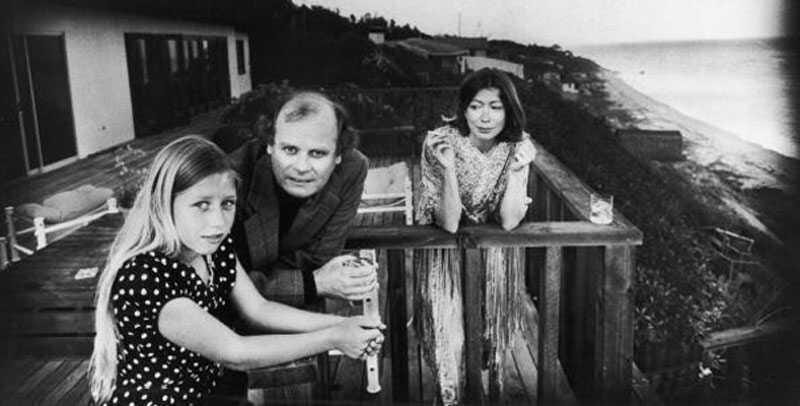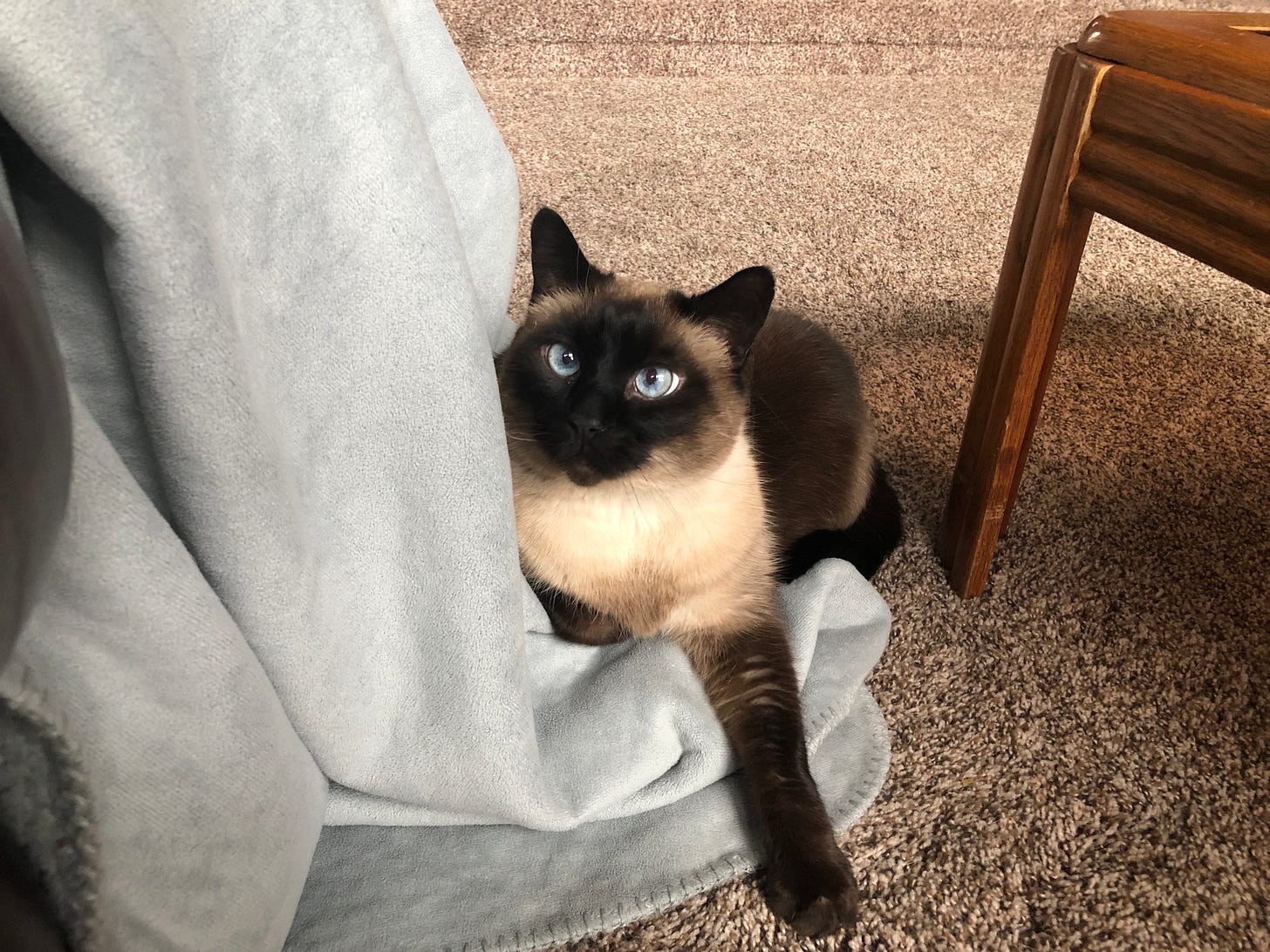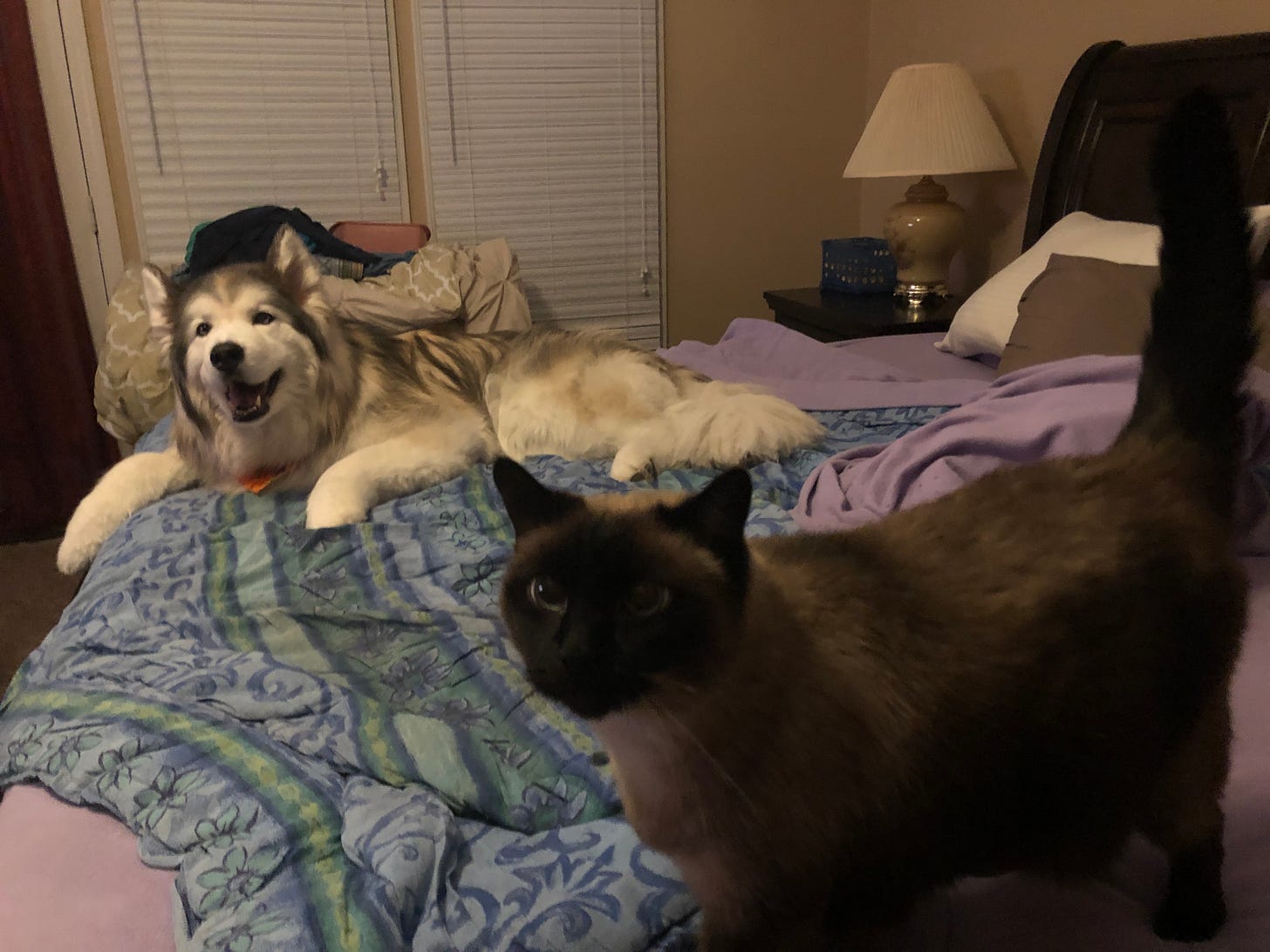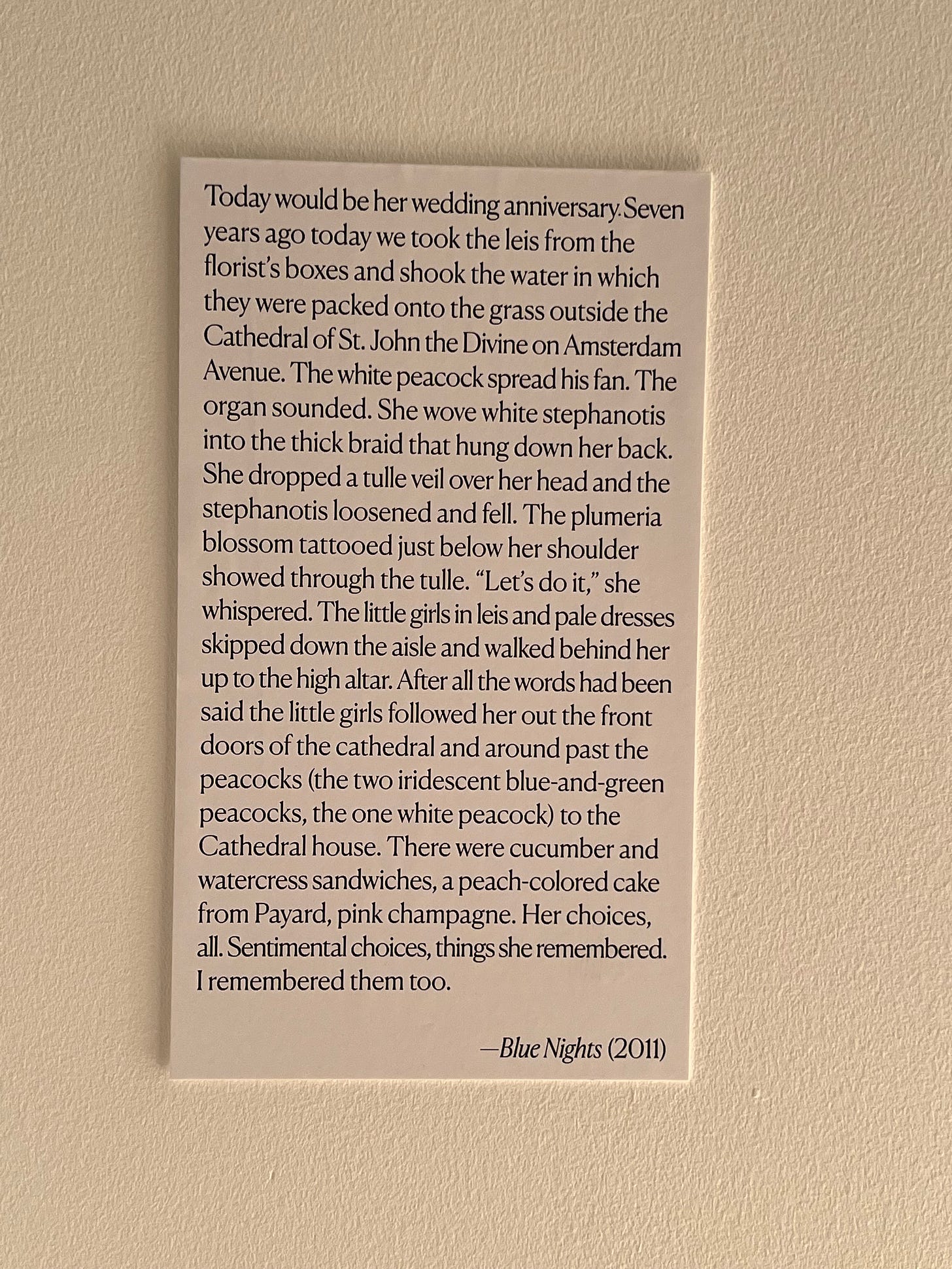The Years of Magical Thinking

Joan Didion’s similarly named book inspired the title of this newsletter. I liked my variation on the Yeats line because it sounds vaguely like a pun, which is the dumb person’s idea of a bon mot, and that’s why I love it.
With this blog, I only have to worry about writing about subjects I care about. Didion says something to that effect in the introduction for Slouching Towards Bethlehem.
I just finished The Year Of Magical Thinking. Though I am at a greater distance from tragedy than she was from here, I can’t help but find similarities between what I endured and what she did. For one, our tragedies occurred at similar times: around the end of the year. Hers occurred on Dec. 30 which was also the final day I saw my mother alive.
Didion and her husband married on Jan. 30, 1964, the day before my mother turned 5. Her daughter married on July 26, 2003, the day after my father turned 54. John Gregory Dunne died a month before what would have been their fortieth wedding Anniversary. Quintana Roo Dunne died a month after the second anniversary of her marriage. This year is twenty years removed from Didion’s year of magical thinking.
I only note the dates because of the slight eeriness of her tragedy happening so close to when mine befell me and other significant dates of her life falling near ones significant to me. Studying dates closely is a recipe for madness or convincing yourself that the universe has a semblance of meaning or structure. Surely all this is not without meaning.
The last thing I ever did with her was watch Birdbox. Her future killer joined us. I found the film wretched then, and its association with the worst day of my life does no favors to it. Vice has earned a similar level of vitriol. I went to a screening of it on New Year’s Eve. I didn’t see my mother that day. I had to head to the newspaper for work. When I returned, she was taking a nap to rest for the New Year’s Eve party later that night. I stayed in my room in the basement and watched the Indiana Pacers play the Philadelphia 76ers. The holiday fell on a Monday. It had been my weekend to work, and it had been my luck to have a teenage suicide occur during my time on the clock. My bitterness is not directed toward that poor kid but to the coroner’s office, who declined to work with me to confirm basic details.
This acrimony was deepened by how they handled things during The Incident™️. I had gotten word from a coworker about the poor child’s death and was given the task of getting official confirmation. Instead, I got the runaround. Eventually, my colleague who worked on the crime beat got official word from the deputy coroner.
I explained that I didn’t need any lurid details or even a name; I just needed confirmation in order to write something brief for the inside section of the paper that I would have an on-the-record confirmation. The newspaper is a grind, especially now in an age where you do the job of three for the pay of one, a salary that would have been inadequate in 1996. By that point in the calendar, you are coasting on fumes. There hardly seems a point to start anything new with the death of the year so close at hand.
It’s also one of the slower points in the year for newspapers. Year in review takes up the bulk of the pages; maybe there are photos and an article about a local charitable organization hosting a Christmas meal for those without anyone or lacking the funds or means for a proper celebration. A reminder that there but for fortune may go you or I. The rest of the year is spent writing about the people and systems that lead people to lonely holidays. January is a slow time. This is why the murder-suicide that took place at my house in the early hours of New Year’s Day was a godsend. It makes a hell of a way to fill A1 above the fold and gives one a deeper appreciation of “if it bleeds, it leads.”
Considering all that I went through that day: finding two people dead from violent acts, having to make the calls that made the deaths real, getting my hands checked for gunpowder, being taken to an interrogation room, and having my phone confiscated, I managed pretty well until I couldn’t.
I had asked people to wait outside, but many insisted on coming inside anyway. They were well-meaning, no doubt, but it just made things more difficult. I have difficulty relinquishing control and feel bad about imposing on people. I wanted to be the one to grab my cat, Khan, so we could get him out of the murder house and to a place where he could be looked after.
We got a hold of him and tried to place him in a carrier, but all the strangers frightened him, and he splayed out his legs so he couldn’t be forced into the carrier and ran away to hide. That was when I finally lost it and snapped. I started knocking things off the counters and tables, my repressed anger finally expressing itself. My brother was on the phone with the coroner then, and instead of asking if everything was okay, she sent a cop there.
I was furious because she couldn’t even cut me some slack on the worst day of my life. As the cop walked up the driveway, I wanted to swing at him. I didn’t like his body language: it was the same arrogant, threatening sort that they display when they pull you over. The kind where they treat you with hostility and as a threat. A friend stepped between us and essentially told him to fuck off but in non-cop-triggering language.
I’ve been thinking of that day much more than normal because now I’m the only one left alive. Khan was the first to alert me that something was wrong. He was meowing and moving in a way that I had not seen since he had first entered my life twelve Januarys before.
Poor Zappa was in the room where it happened. He was on the bed and wouldn’t move from it. He must have seen it all, or maybe just the aftermath. He died two years ago in the fall. Khan joined him sometime earlier this year. On the day of The Incident™️ I was worried he would be shot, too. He looked like a wolf, and cops have a well-deserved reputation for shooting dogs just on a whim. They’ll claim self-defense, but ultimately, they are cowards and bullies. They kill dogs for the same reason they kill people: they know they can get away with it because no one will ever hold them accountable for anything they do. They take care of their own. Good luck getting any justice if a pig plugs a loved one.
Very little was comforting on that day, but I took solace in all three of us still being here. Zappa was 13 when he passed, and Khan was 17. Decent lifespans for a husky and a Siamese cat. Now it’s just me, and the most alienating experience of my life has become far more alienating.
“The drama's done. Why then here does any one step forth?- Because one did survive the wreck.” Herman Melville, Moby-Dick, Chapter 136, Epilogue.
Didion writes about the way those in grief can see omens and portents of their tragedy in hindsight.
“Survivors look back and see omens, messages they missed. They remember the tree that died, the full that splattered on the hood of the car. They live by symbols. They read meaning into the barrage of spam on the unused computer, the delete key that stops working, the imagined abandonment in the decision to replace it.” Joan Didion, The Year Of Magical Thinking, page 152
It’s something that rings true for me. For years, I saw birds of prey perched on telephone poles and wires, in trees, on fence posts marking the boundaries of fields. And sometimes in the sky above. Perhaps it was the Baader-Meinhof effect or the reality of living in a more rustic setting. If I’d witnessed it in a piece of fiction, I would have found such imagery too on the nose. Maybe noticing it was my way of giving meaning to my tragedy. To make it more than a life-shattering act of violence. My own form of magical thinking. In Didion’s case, she mentions a heart-related problem her husband, John Gregory Dunne, has addressed. The medical professional he sees about it refers to it as the widowmaker. He accepts that this will likely be what brings about his end. He comes from a family with heart problems.
About a month before The Incident ™️ , I had expressed concern that just such a thing might happen. Mom had met someone else. Her killer had found out. She was shocked to know that I knew. I told her that just because I was a loser didn’t mean I was completely unaware of things and that the power of observation was one reason I was effective as a reporter. There was tension in the house to the degree that I locked my door each night on the off chance that it would buy me some time should he decide to start shooting.
They tried to patch things up, but that relationship had run its course. You see this sometimes with sports teams. They wait too long to blow things up, leading to misery for all involved. Unlike a sports team, there would be no rebuilding from this.
I’d feared something like this happening for a while. One summer night, I’d managed to lock myself out of the house. I had locked the garage door by mistake and didn’t remember the code to get in. All the other entrances were locked, and I didn’t have my phone, so I decided to tough it out in the garage until morning. I listened to the radio to while away the time. I found a channel airing Coast To Coast AM and heard about Indigo Children and other esoteric views. I didn’t dare bang on the door or do anything that might make me seem like a burglar. I didn’t want to get shot by mistake.
I held it together pretty well that day, the same way as Didion does when her husband is taken to hospital. One of the staff calls her a cool customer for her temperament. And it’s only because she’s in shock or denial about what has just happened. One moment, they’re about to eat dinner. The next one of them is dead. She doesn’t know it then, but nothing could have been done to save her husband. Until she gets the autopsy, she doesn’t know for sure. I had similar thoughts about my mother.
When I found them, he was on his back, right on the threshold of the master bedroom, empty eyes gazing at nothing.
When I first saw him, I thought that maybe he had a terrible accident, that in drunken revelry from New Year’s, he’d accidentally hit his head in a fatal way. The blood on the dorm frame suggested that. Then I saw the bullet hole in his head. Something pink was oozing out of it, reminding me of the slime in Ghostbusters II. I like to joke that I have a unique insight into the inner workings of the marine mind. I marvel at the fact that a jarhead actually had something in there. I assume it was his brains or something else that you’re not supposed to see because it is covered in bone and flesh. I use brains, because the bullet had divided his brain into several parts.
Didion’s husband also suffered a head injury. When the cardiac incident that killed him occurred, he struck his head against the table on the way to the ground.
I was spared the sight of what the gun had done to my mother’s face. She was on her stomach, a pool of blood soaking into the carpet.
As I stepped over his corpse like Allen Iverson over Tyronne Lue in Game 1 of the 2001 NBA Finals, a comparison I made later that day, I saw the gun on the floor. I knew the implications, and I knew touching her would confirm what I already knew: that she was dead. What I didn’t expect was how cold she would be. My rough estimate of the timeline is that I found her about five hours after she died. It was shocking to me how quickly the warmth had fled. My mother was a warm person, both in temperament and physically.
When she hugged you, you could feel her warmth. I tend towards warmth myself because that’s the kind of person she raised me to be and the physical reality of my body. Just the other day, someone commented positively on the warmth of my hands. I am a big man, and I dress in defiance of the calendar and forecast. I wear jeans and a hooded sweatshirt almost daily, regardless of the temperature. I run hot.
At the time, I wondered if she had died in agony because of me. I’d been awoken around 3:30 that night. I’m not sure if it was the gunshot or something else that did it. The medication I was on at the time would often lead me to wake in the middle of the night to use the facilities.
I have no memory of a gunshot, but maybe it roused me from a deeper slumber. I heard a loud crash above my head, which made me wonder if my mother had fallen. She’d had a knee replacement in October and a hip replacement in April, so I was rightfully worried.
Then I heard her laughter and knew that everything was okay. I suppose that is true in one sense. She was free of earthly cares. The laughter is something I can’t explain. She would have been dead by then. I worked out later that the big crashing noise was that of a body hitting the ground, either hers or his. Regardless, my mother was dead when I heard that laughter.
We’d lived in that house for just over two years. Until the laughter, I’d never had anything supernatural or unexplainable happen to me. My brother and his wife had weird occurrences involving old photographs. One time, lights in the master bathroom were turned on without explanation. The man who killed my mother had gotten the worst of it. Whatever dwells in the house is centered on his room.
My mother’s murderer had weird, violent dreams and once awoke to the sensation of being massaged. Mom had the priest bless the house, and he slept with a rosary on or near him, and the dreams stopped.
My friend, who is sensitive to that sort of phenomenon, said that whatever presence was there was just happy to be acknowledged. He described it as an observer.
Taking that to heart, I’d occasionally act aggressively towards the presence. I’d talk trash at it, throw up a choke sign, and grab my crotch at it in homage to Reggie Miller.
I later joked that it never messed with me because I wore a moral vest.
Ultimately, it was his own doing that led to New Year’s Day 2019. But part of me wonders if it was an Amityville Horror sort of situation. He was vulnerable in a lot of ways, like his alcoholism and a psyche haunted by what he’d done in the Marine Corps.
Generally, I’m skeptical of that sort of thing, but the hearing laughter part gives me pause. Some would suggest that it was merely a product of my trauma-addled brain, wishful thinking on my part. But my memories of that day are very clear. A curse of my excellent memory is that I remember even things I don’t want to in exacting detail.
Something told me to stay put, the volume of the crash was unnerving, and to this day, when I hear a big crashing noise above me, it can sometimes cause a minor PTSD episode, especially if I’m in a basement. The recent 4.4 earthquake in South Pasadena unnerved me for that reason.
I went back to sleep and found them about five hours later when I’d gone upstairs to get a drink of water. Based on the placement of the pool of blood in the carpet, I was worried I’d consigned my mother to an agonizing death, shot in the stomach or elsewhere.
Had she cried out for help, and had I selfishly slept through it? If so, she must have felt like Jesus when he prayed in Gethsemane and found that his disciples had fallen asleep even though he’d asked them to stay awake to keep him company as he agonized over what he had been asked to endure.
When planning the funeral, I asked the funeral director about the possibility of an open-casket funeral. He explained that it wasn’t possible. She had been shot point-blank between the eyes. She had powder burns on her face. Nothing could have saved her after that. It must have happened incredibly fast. I can’t imagine the conversation they had on the way back from the party. She was still in her party clothes. I remember her purse was on the edge of the bed. He had to go downstairs to retrieve the gun.
Had I woken up earlier, I might have come out of my room as he exited the room where he kept the pistol. Maybe he would have shot me. Maybe my mother would have heard it and had a chance to save herself. I would make that exchange in a heartbeat. My life is not particularly worth saving. Certainly not compared to hers, an attorney who did pro-bono work did medical malpractice and did her damnedest to ensure her clients were given justice.
“Only After I read the autopsy report did I begin to believe what I had been repeatedly told: nothing he or I had done or not done had either caused or could have prevented his death. He had inherited a bad heart. It would eventually kill him. The date on which it would kill him had already been, by many medical interventions, postponed. When that date id come, no action I could have taken in our living room — no home defibrillator, no COR, nothing short of a fully equipped crash cart and the technical facility to follow cardioinversion within seconds with IV medication—could have given him even one more day.” Joan Didion, The Year Of Magical Thinking, 206-207.
Like Didion with her husband, I tried to give my mother the funeral she’d have wanted. I got her favorite priest to lead the funeral mass, and I picked out the songs she loved to sing at mass. I did my best in an impossible time. I had to hold it together for her sake because she’d spent half a lifetime doing that for me.
I’ve thought of that every day since it happened, and I relive it every day like Prometheus chained to the rock and waiting for the eagle to tear out and devour his liver. Or Sisyphus, doomed to push a boulder up an incline but never reaching the top. One must imagine Andrew happy. I can’t go on. I’ll go on.
The endless videos and photographs of Palestinian suffering have rendered this recurring imagery more vivid. Every day, I see a new horrifying image that makes me relive the worst day of my life. And I’m getting off lightly; I only have to revisit it and not live through something that shows no sign of stopping.
“Why me?”
“That is a very Earthling question to ask, Mr. Pilgrim. Why you? Why us for that matter? Why anything? Because this moment simply is. Have you ever seen bugs trapped in amber?”
“Yes.”
“Well, here we are, Mr. Pilgrim, trapped in the amber of this moment. There is no why.”
Kurt Vonnegut, Slaughterhouse-Five.
Along with the death of her husband, Didion also had to deal with her daughter Quintana being hospitalized with life-threatening illnesses. Those took a toll on her and eventually led to her death on August 26, 2005. She was just 39.
The murder of my mother cost me so much beyond her. It also cost me my home, my job, and my career. I am not the same man or writer I was before The Incident™️. I won five awards for my writing in 2019, all for work completed the previous year. I haven’t done anything of note since then, professionally or personally. When he murdered my mother, he did the same to me. Mine is a slow death; I am forced to continue and witness my life slowly falling apart. Life is over for me, and there is nothing good in store for me: no joy, no love, no success, and no more songs. All my happiness is gone. It’s gone somewhere beyond.
Putting a bullet in my head would have been more merciful by far. I understand why Phil Ochs hung himself. I’ve resigned myself to a similar end for myself. I’m just too much of a fuck-up to get it right. Whatever attempt at ending my suffering I’d make would only make it worse. Plus, there’s my desire not to inflict the horror of finding a body on someone else. I’d want to do it in a way that would remove all doubt that I was dead while sparing others from a cleanup. If anything saves me, it will be my incompetence.
It’s been five years of magical thinking and many blue nights. I don’t remember my dreams much these days. But there are times when my mother is present. Rumors of her death are greatly exaggerated. Turns out she didn’t die; she just had to recover from the injury.
I dreamed I saw my mom last night
Alive as you and me
Says I to mom “You're five years dead”
“I never died” says she
“I never died” says she
I know she is gone beyond all recall, but it all feels like I’m just holding my breath. It is as if everything I’ve endured since that first day of the year five years ago is one long bad dream. It'll make it all real if I move on and act like nothing happened. But if I hold on to this grief, hold on to her, perhaps one day I’ll wake up from this living nightmare, and she’ll be there just like she was for the first three decades of my life.









